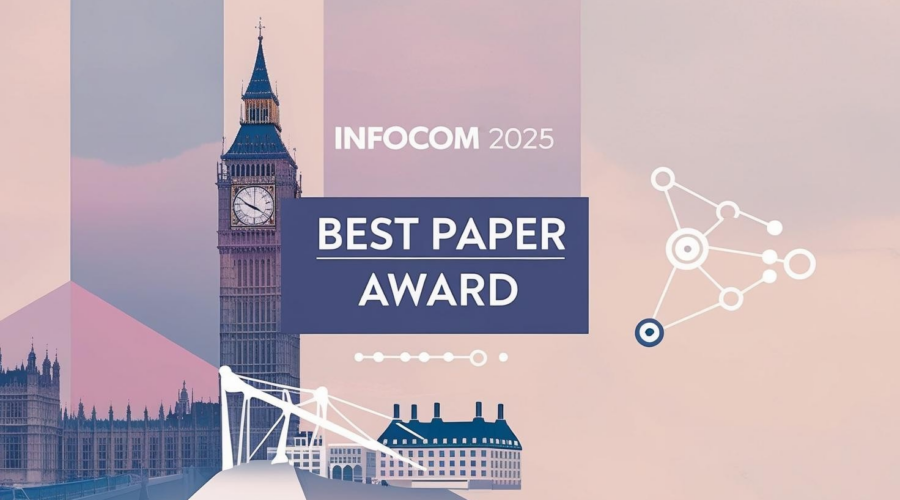IMDEA Networks

IMDEA Networks' work on distributed inference in mobile networks wins Best Paper Award at IEEE INFOCOM 2025
The awarded paper, titled "DUNE: Distributed Inference in the User Plane", was co-authored by Beyza Bütün, David De Andrés Hernández, Michele Gucciardo, and Marco Fiore
24 April 2025

IMDEA Networks has received the Best Paper Award at the international conference IEEE INFOCOM 2025 (taking place this year in London, UK), one of the world’s most prestigious events in the field of communication networks. The winning paper, titled “DUNE: Distributed Inference in the User Plane“, introduces a scalable approach to realize AI-based inference directly within the user plane of networks. The research was conducted by Beyza Bütün, David De Andrés Hernández, Michele Gucciardo (who has since moved from the institute to NEC Laboratories Europe), and Marco Fiore.
The study proposes a novel way to embed artificial intelligence (AI) capabilities into the transport layer hardware that represents the fundamental fabric of modern network infrastructures such as mobile networks or cloud datacenters. Unlike previous proposals that rely on the control plane or that attempt squeezing AI models into a single user-plane device, DUNE distributes the inference workload –the process by which an AI model makes decisions or predictions– across the whole network user plane. By decomposing the original AI task across many devices, such as programmable switches, Data Processing Units (DPUs), or smart Network Interface Cards (smartNICs), DUNE achieves high scalability and improved accuracy while preserving the ultra-low-latency and line-rate-throughput of user-plane processing.
The team validated their proposal not only from a theoretical standpoint but also through real-world testing on an experimental platform with production-grade programmable network hardware operating at 100 Gbps, demonstrating that the DUNE approach can be applied in practical settings and with significant gains in terms of efficiency (with respect to single-equipment user-plane solutions) and speed (with respect to control-plane strategies).
Reflecting on the significance of the work, Prof. Marco Fiore explains: “The distributed nature of DUNE represents a leap in the way AI is integrated into network fabrics, which removes major limitations in terms of scalability of previous proposals for user-plane inference. DUNE paves the way to unprecedentedly fast, accurate and thorough classification of network traffic, which can revolutionize tasks such as traffic engineering, network slice management or intrusion detection”.
Lead author Beyza Bütün adds: “What makes DUNE truly stand out is how we transformed a conceptual shift into a practical solution — we designed an automated system that decomposes and maps a complex ML model into distributed sub-models, tailored for and implemented on real-world programmable devices. The experiments on a 100 Gbps testbed including multiple programmable devices, using actual network traffic, validated not just feasibility but clear gains in accuracy — showing that distributed inference isn’t just an idea, it’s ready for deployment.”
For David de Andrés Hernández, the award also reflects the collaborative spirit of the project: “Joining the team as DUNE was taking shape, I found myself learning a lot from the groundwork already in place, and building on that momentum. It was great to be able to bring in some fresh perspectives and see them evolve through open and thoughtful collaboration. To me, this award feels like a nice recognition of that shared effort, of different ideas coming together to make a compelling contribution.”
This award carries special meaning for IMDEA Networks, as it marks the second consecutive year that a paper from the institute receives this recognition at IEEE INFOCOM, a rare achievement for a research organization in a conference of such high international prestige.
With this recognition, IMDEA Networks strengthens its international leadership in intelligent networking research and reaffirms its commitment to scientific excellence in developing innovative solutions for the future of telecommunications.


Recent Comments